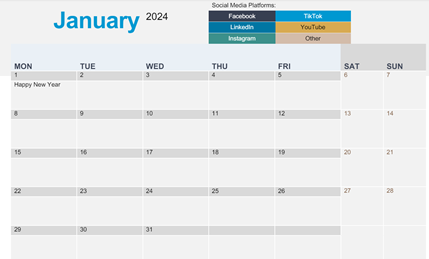Wednesday April 03, 2024
The importance of community social media in your association
 The online image of your homeowners association (HOA) or condo owners association (COA) acts as the digital front yard that not only attracts potential residents but also creates a sense of community for current members. But what constitutes your HOA or COA's digital footprint, and how do you effectively manage online presence to nurture an active, involved community?
The online image of your homeowners association (HOA) or condo owners association (COA) acts as the digital front yard that not only attracts potential residents but also creates a sense of community for current members. But what constitutes your HOA or COA's digital footprint, and how do you effectively manage online presence to nurture an active, involved community?Engaging positively on social media—forming special interest groups within your association, asking for residents’ opinion via polls, sharing event photos, providing community updates, and sharing your industry expertise through educational materials—can drive the narrative in the right direction, which is the key to successful online reputation management.
Online reputation management - what does it mean to manage online presence?
Online reputation management (managing online presence) is the process of monitoring and influencing how your business is perceived on the internet, with the aim of neutralizing negative sentiments and promoting positive ones (according to search engine optimization leader, Semrush).Since 75% of internet users use social media to research brands/products (according to DataReportal, 2022), it’s essential to manage online presence for your association by using social media platforms like Facebook, LinkedIn, etc. to manage your association’s online reputation. Once you know which platform(s) your target audience uses most, it’s all about using it often and knowing how to make the most out of it.
How to make the most of social media pages to manage online presence for your association

For board members
Your social media business page represents the official brand of your association. It provides a place where residents can easily connect and stay informed. However, keep in mind:- Avoid implied favoritism. Don't "friend" residents but, as a page, feel free to join in on resident conversations frequently.
- Err on the side of caution. Know when to take public discussions offline. You can do this by sending a private message or email, making a phone call, mailing a letter, or visiting them in person.
- You're a brand ambassador. When speaking on behalf of your association or fellow board members, keep a positive attitude about the community. See dos and don'ts of effective board communications here.
- Be responsive. Appoint a fellow board or committee member to monitor your business page and promptly respond to comments. Stuck on how to respond? See our example ways to respond on social media here.
- Confidentiality is key. Keep your association's legal information away from all social media.
- Know your resources and stay informed on social trends:
- Use multiple channels of communication to share important messages. See our list of top board communications tools here.
- Emojis are proven to increase engagement. Use them within posts (when relevant) to emphasize certain content or break up text, but don’t overdo it.
- Don’t push too many ads or posts that try to “sell” your association. Social media users are more likely to follow pages that provide valuable content rather than those that constantly advertise. If you’re constantly “selling” your association, users may see it as spammy.
- Use free tools like Canva to create quick graphics for your association’s announcement posts.
- Use a planning calendar to keep track of your association’s posts to ensure you’re consistently offering a variety of relevant content.

- Use multiple channels of communication to share important messages. See our list of top board communications tools here.
- Engage with the page - don't be afraid to ask questions; others may also be wondering the same thing. Initiate conversation on your association’s social media page by posting a question/greeting or responding to social posts that inspire discussions with fellow residents.
- Take online polls - inform board members. Cast your vote on community polls posted by your association’s board. This helps board members make more informed decisions based on residents’ input. So if you want to make a difference in your association, vote!
- Tune in for status updates and respond. For example, responding to direct questions from the association can provide just the solution your association needs. This also gives you an active say in the success of the community.
- Join groups. Create special interest groups on social media as a great way to find other homeowners with similar interests (examples: running group, wine down Wednesday group, book club, etc.). Take pictures of your get-togethers and post to the group on social media, encouraging others to join.
- Share photos of community events. If you use your association's unique amenities to host or participate in events, take pictures and post about it!
8 ways to manage online presence with social media:
For HOA and COA board members in Texas, here are eight ways to effectively manage online presence with social media:- Use a social media calendar. A social media planning calendar provides a visual to help you vary the types of content you post and see how often you’re posting. You can also use a social calendar to observe content performance and peak posting times to maximize exposure of future posts.
- Vary your content and post often. Post a mix of different types of content, rotating between categories like board education, community event pictures, and association news/announcements. Post often to ensure the platform pushes your fresh content to users’ feeds.
- Use your platforms to feed your other platforms. Link to your social media pages from your association website and vice versa. Make some of your social posts link back to your website. This is an easy way to guide more traffic to both your website and social media pages.
- Ensure your association’s social media pages are business pages. Business pages promote your association to a wider audience, unlike personal social media pages, which are geared toward a smaller circle.
- Note: proactivity is key. Don’t wait for a crisis to happen. To manage online presence, regularly monitor and address comments, reviews, and feedback to maintain a positive image.
- Be transparent; build trust. When addressing concerns or negative feedback, transparency and openness in your responses can turn challenges into opportunities to demonstrate commitment and responsiveness.
- Promote positive sharing. Encourage residents to share their positive experiences and stories related to the community, which can organically strengthen your association's online presence.
- Position your association as the industry expert. Share helpful informational material for residents about industry trends, legislative updates, board education articles, and more.
More ways to manage online presence for Texas HOAs or COAs:

Understand your HOA or COA’s online reputation.
The collective view people have of your association online is crafted by the content you publish, including your social media activity, search engine rankings, online reviews, and your responsiveness to feedback. The content on your official association website along with any photos and videos of your community help manage online presence by shaping your digital persona.Emphasize the importance of a positive online reputation.
Since 88% of online users turn to a simple search engine when they need answers (according to HubSpot marketing platform), it’s crucial for your association to uphold a positive online reputation. Negative online impressions can steer potential newcomers toward other communities with more positive reviews and appealing online engagement. Higher review ratings and positive feedback are linked to better retention rates and overall community satisfaction.Boost your association’s online presence.
Essential measures to manage online presence for your association include claiming your business listings on platforms like Google and Yelp, boosting your social media engagement, encouraging reviews, and actively responding to those reviews. Also, it’s important to maintain a compelling, up-to-date website with relevant information for visitors of your association’s site.Use proven strategies for driving traffic to your HOA or COA website.
Your association’s website should not only be visually appealing but should also be functional – a user-friendly experience that clearly features the unique benefits of living in your association. This may mean a simpler, easier-to-use website layout rather than an overly embellished site that’s harder for users to navigate.Use your association’s website as the ultimate brochure – showcase community photos, videos, and fresh content that shows your expertise. Use search engine optimization sites like Google Trends or Answer The Public to see what popular terms people are researching in your industry, and use these terms throughout the copy on your website. Prioritize user-friendly navigation, mobile responsiveness, accessible contact info, and spotlighting resident testimonials and success stories.
Recognize the advantages of AI’s impact on your association’s online presence.
Artificial Intelligence (AI) has profoundly impacted how HOAs and COAs manage online presence by revolutionizing how they engage with their communities. For example, AI tools like chatbots on association sites enhance customer service by offering immediate responses to resident inquiries, reducing wait times, and freeing up staff to focus on more complex issues. Also, free AI tools like ChatGPT and Gemini can help craft clever copy for posts if your social media manager has writer’s block.Prioritize the vital role of your association’s digital reputation.
 Your HOA or COA’s online reputation management is a continuous effort that requires strategic actions on your association’s website and social media page(s). By improving your virtual curb appeal, you not only attract new residents, but you also instill a sense of pride and community among existing members. To manage online presence effectively, your board should focus on creating a vibrant, cohesive online environment that residents are delighted to call “home.”
Your HOA or COA’s online reputation management is a continuous effort that requires strategic actions on your association’s website and social media page(s). By improving your virtual curb appeal, you not only attract new residents, but you also instill a sense of pride and community among existing members. To manage online presence effectively, your board should focus on creating a vibrant, cohesive online environment that residents are delighted to call “home.”Downloadable: What’s your association’s social media strategy to manage online presence?
Grab our social media content calendar template and boost your HOA or COA’s online presence today! It's color-coded by platform, but feel free to customize it so it works for your unique association.Open our printable Social Media Calendar Template HERE.

OR
Download our fillable Social Media Calendar Template HERE.
While you're posting on your association's social media pages, don't forget to connect with FirstService Residential on LinkedIn and Facebook. See you there!
FirstService Residential is simplifying property management.
Our FirstService Residential Texas family enjoys peace of mind knowing they’re in good hands. They can count on our 24/7 customer service for tailored solutions that take the balancing act out of property management. And our service-first philosophy means we don’t stop until what’s complicated becomes uncomplicated. To make life, simplified.If your association is not currently managed by FirstService Residential Texas, we would love to learn more about your community. Please click below and fill out a short Request for Proposal to set up a no-strings-attached conversation about how we can best support your association. We look forward to meeting you!